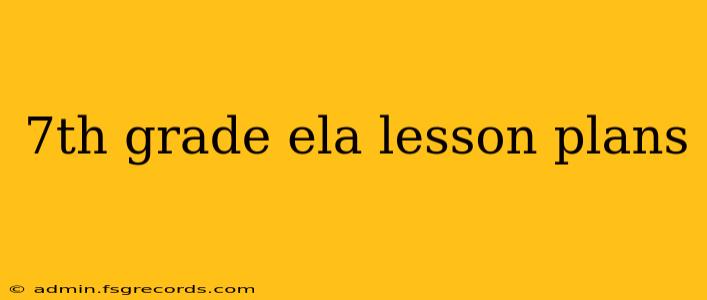Teaching 7th-grade ELA requires a dynamic approach that balances rigorous standards with engaging activities. This guide offers lesson plan ideas focusing on key areas, incorporating diverse teaching strategies to cater to various learning styles. Remember to always adapt these plans to your specific students' needs and the available resources.
Unit 1: Exploring Literary Genres and Narrative Techniques
Time Allotment: 4 weeks
Focus: Introducing students to various literary genres (short stories, poems, drama excerpts) and analyzing narrative techniques (plot, characterization, setting, theme, point of view).
Learning Objectives: Students will be able to:
- Identify and analyze different literary genres.
- Define and apply key narrative techniques in literary analysis.
- Develop critical thinking skills through textual analysis and discussion.
- Write effective literary analyses.
Lesson Ideas:
-
Week 1: Introduction to Short Stories. Begin with a captivating short story, such as “The Gift of the Magi” or a contemporary young adult short story. Focus on plot structure, character development, and setting. Activities include graphic organizers, character sketches, and class discussions.
-
Week 2: Analyzing Poetry. Introduce different poetic forms (sonnets, free verse, haikus). Analyze imagery, figurative language (metaphors, similes, personification), and poetic devices. Activities include close reading exercises, creative writing prompts (writing poems in different styles), and poetry slams.
-
Week 3: Drama and Dramatic Techniques. Explore excerpts from Shakespearean plays (age-appropriate selections) or contemporary dramas. Focus on dialogue, character interaction, and dramatic irony. Activities include role-playing, script analysis, and creating short dramatic scenes.
-
Week 4: Comparative Analysis. Students compare and contrast different genres, analyzing how narrative techniques are used differently across forms. Culminating activity: A comparative essay analyzing two different texts from different genres.
Unit 2: Mastering Informational Text and Research Skills
Time Allotment: 3 weeks
Focus: Developing students' skills in reading, analyzing, and synthesizing information from various sources.
Learning Objectives: Students will be able to:
- Identify main ideas and supporting details in informational texts.
- Evaluate the credibility and bias of sources.
- Conduct research using multiple sources.
- Synthesize information from different sources to form a coherent argument.
- Cite sources correctly using MLA or another appropriate style.
Lesson Ideas:
-
Week 1: Analyzing Informational Texts. Introduce different types of informational texts (articles, essays, biographies). Focus on identifying the author's purpose, tone, and intended audience. Activities include annotating texts, summarizing key information, and identifying bias.
-
Week 2: Research Skills and Source Evaluation. Teach students how to use library databases and online resources effectively. Focus on evaluating the credibility and reliability of sources. Activities include creating annotated bibliographies and evaluating websites for bias and accuracy.
-
Week 3: Research Project and Presentation. Students conduct research on a topic of their choice, synthesizing information from multiple sources. Culminating activity: A research paper and presentation, demonstrating effective communication and source citation.
Unit 3: Writing Workshop: Argumentative Essays
Time Allotment: 3 weeks
Focus: Developing students’ argumentative writing skills, including constructing strong claims, developing supporting evidence, and refuting counterarguments.
Learning Objectives: Students will be able to:
- Construct a clear and concise thesis statement.
- Develop supporting arguments with evidence and reasoning.
- Acknowledge and refute counterarguments.
- Organize an argumentative essay logically and coherently.
- Edit and revise their writing for clarity, grammar, and mechanics.
Lesson Ideas:
-
Week 1: Understanding Argumentation. Introduce the elements of argumentative writing, including claims, evidence, reasoning, and counterarguments. Activities include analyzing model essays and brainstorming potential essay topics.
-
Week 2: Developing Arguments and Evidence. Focus on gathering and evaluating evidence to support claims. Activities include outlining essays, conducting research, and practicing effective reasoning.
-
Week 3: Refining and Revising. Students peer-review and revise their essays, focusing on clarity, organization, grammar, and mechanics. Culminating activity: A final polished argumentative essay.
This is a framework; remember to adjust the pacing and content to suit your students’ individual needs and the specific curriculum requirements. Incorporating technology, collaborative projects, and creative writing assignments will make these lessons engaging and effective for your 7th-grade ELA students.

